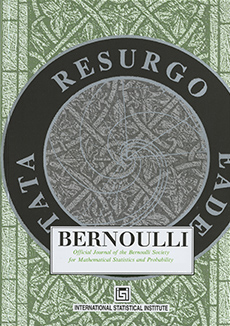Abstract
Random partitions can be thought of as a consistent family of exchangeable random partitions of the sets {1,2,...,n} for n≥1. Historically, random partitions were constructed by sampling an infinite population of types and partitioning individuals of the same type into a single class. A particularly tractable way to construct random partitions is via random sequences of 0s and 1s. The only random partition derived from an independent 0-1 sequence is Ewens' one-parameter family of partitions which plays a predominant role in population genetics. A two-parameter generalization of Ewens' partition is obtained by considering random partitions constructed from discrete renewal processes and introducing a convolution-type product on 0-1 sequences.
Citation
James E. Young. "Binary sequential representations of random partitions." Bernoulli 11 (5) 847 - 861, October 2005. https://doi.org/10.3150/bj/1130077597
Information





